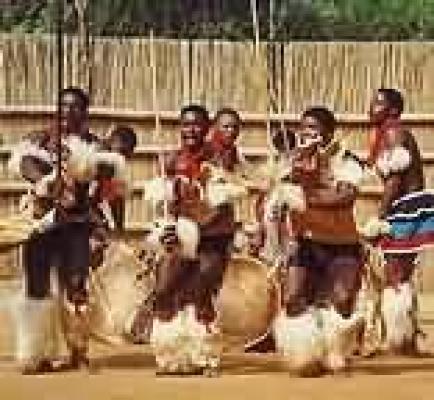Swaziland Game Reserves |
Swazi Arts & Crafts |
Swazi Visitors Information
The Swazis are predominantly Nguni in language and culture. They originate from east central africa. As part of the Nguni expansion southwards, the Swazi crossed the Limpopo river and settled in southern Tsongaland in the late fifteen century.
Swaziland has been inhabitated since the early stone age and there are tracks of subsequent occupation by Bushmen, Sotho and Ntungwanguni clans. Swazi simply means the people of Mswati.
Rock paintings attributed to the San have been identified in many parts of Swaziland. The paintings usually depict animals, people, hunting parties, battle scenes and dances.
Drive along any road in Swaziland and you will likely see many Swazi's dressed in colourful costume, featuring a bright toga-like garmnet - the mahiya.You may also meet Swazi warriors carrying battle-axes.The women that you encounter may sport the traditional "beehive" hairstyle, which is still very popular today.
Cultural Events
For all the modernisation that has come to Swaziland, the people have preserved their age-old culture and traditional ceremonies.The two most important and colourful of these, in the eyes of Swazi's and foreigners alike, are the
Incwala in December and the
Umhlanga in late August or early September.
The Incwala or "first fruits" ceremony is rich in symbolism and the most important and sacred of all Swazi ceremonies.During the Incwala, all people, especially male, converge at the Royal Kraal at Ludzidzini for several weeks of traditional dancing which is always joined by the King.
The Umhlanga or "Reed Dance" is the second most important ceremony as well as one of the most colourful.The ceremony is specially for unbetrothed maidens to pay homeage to the King and Queen Mother.
Although these ceremonies, which are at the core of Swazi culture, are performed but once a year, there are still many opportunities to witness traditional Swazi customs.The sibhaca dance, vigorous in style, is performed by teams of men throughout the country. Teams of dancers enterain visitors regularly at the Royal Swazi Sun, Lugogo SunHotel and Ezulwini Sun Hotels, as well as Mlilwane Wildlife Sanctuary, Mkhaya Game Reserve and Hlane Royal National Park.
Cultural Village
The Cultural Village, situated in Mantenga Nature Reserve in the Ezulwini Valley, is a living museum of all things traditional and represents classical Swazi Lifestyle during the 1850s.
The Cultural village offers an opportunity to view traditional dancing and take a tour of the village giving you the experience and understanding of traditional life in a Swazi homestead.
The Cultural Village is open to visitors every day from 8 am to 5 pm. The traditional dances are held at 11.15 and 15.15 every day.


